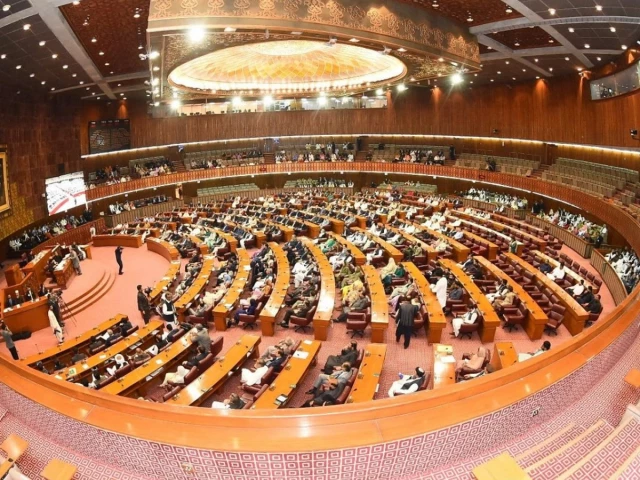Lawmakers call Singh’s comments “highly condemnable” and call them an assault on the country’s sovereignty.
The National Assembly passed a resolution condemning Indian Defense Minister Rajnath Singh’s recent comments on Sindh, calling his statement an attack on Pakistan’s sovereignty.
The resolution, moved by Pakistan People’s Party lawmaker Aslam Alam Niazi during a session chaired by President Ayaz Sadiq, declared the Indian minister’s comments “highly condemnable” and stated that the statement constituted “an assault on the sovereignty of Pakistan.”
The resolution further stated that “Sindh is an inseparable part of Pakistan”, reaffirming the constitutional and historical status of the province within the federation. Assembly members expressed strong disapproval of what they described as India’s interference in Pakistan’s internal affairs.
The House passed the resolution moved by MNA, Mr. Asad Alam Niazi, strongly condemning the recent comments stating that “Sindh may one day return to India” and that “civilisationally, Sindh will always remain a part of India”.
The House reaffirmed that Sindh is an integral part… pic.twitter.com/Usz6Ogw9k4— National Assembly 🇵🇰 (@NAofPakistan) November 27, 2025
During Thursday’s session, the National Assembly also passed several bills, including the King Hamad University of Nursing and Associated Medical Sciences (Amendment) Bill 2025.
Read more: FO slams Rajnath Singh’s ‘delusional’ comments on Sindh
Sindh Assembly condemns Rajnath Singh’s statement
The Sindh Assembly also passed a joint resolution condemning a “provocative” statement by Indian Defense Minister Rajnath Singh, who recently claimed that Sindh was historically part of India. The resolution, presented jointly by the Treasury and the opposition, was approved unanimously by all legislators.
The resolution was moved by PPP minister Mukesh Chawla. Parliamentary Affairs Minister Zia Lanjar told the House that the opposition had backed the measure, making it a joint resolution. MQM’s Mahesh Kumar Haseeja read the text on the floor.
Speaking in the Assembly, Chief Minister Murad Ali Shah condemned Singh’s comments as “highly provocative and baseless”. He said that the history of Sindh predates the pre-Islamic era, and ancient Sindh is spread across regions like Multan and Makran. He noted that the Sindh chapter of the Muslim League was one of the first to support the creation of Pakistan.
Referring to Singh as a minister “born in Uttar Pradesh and unaware of the Indus heritage”, Shah described the comments as a sign of frustration. “Whoever has drunk the Indus water cannot betray this land,” he said, adding that Sindh is an integral part of Pakistan. He urged the federal government to circulate the resolution internationally to draw the world’s attention to India’s designs on the Indus River.
Opposition leader Ali Khurshidi also backed the resolution, saying Pakistan’s armed forces had given an “appropriate response” to Indian aggression. He assured the House that the opposition supported the measure regardless of political differences.
Provincial Minister Saeed Ghani said Pakistan’s armed forces and people bravely defeated India in the recent conflict. Education Minister Sardar Shah called Singh’s statement “ignorant”, highlighting the 6,000-year history of Sindh. He commented that if India claimed Sindh, Pakistan could similarly claim Gujarat and Haryana.
The MQM’s Muhammad Wasim advised India to “stop dreaming” and accept reality, while the PPP’s Giyan Chand Essrani said India’s leaders seemed “fear-bound”. Other lawmakers from the Sunni Ittehad Council, MQM and Jamaat-e-Islami also condemned the Indian Defense Minister’s remarks.
Indian Defense Minister Rajnath Singh, speaking at an event in New Delhi a few days earlier, had said: “The land of Sindh is not part of India today, but culturally, Sindh has always remained part of India.”
He added that the borders “keep changing”, saying: “No one knows if Sindh can become part of India again tomorrow. The people of Sindh, the owners of the Indus River, will always remain ours. It does not matter where they live; they will always be ours.”
Singh further said that former BJP leader LK Advani had written that Sindhi Hindus, particularly those of his generation, had never accepted the separation of Sindh from India. He also stated that Hindus across India consider the Indus River sacred.




